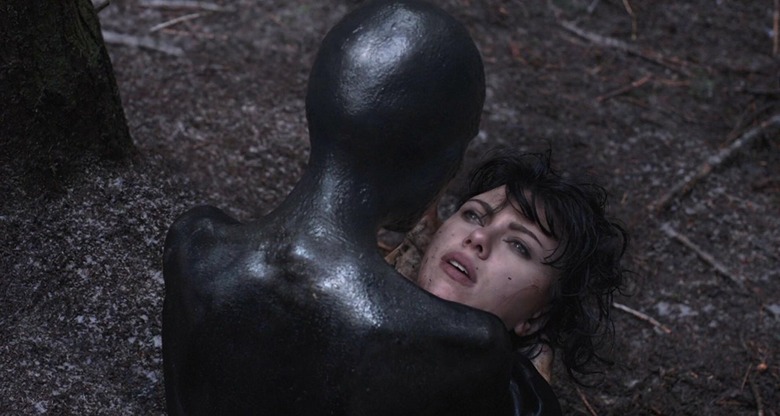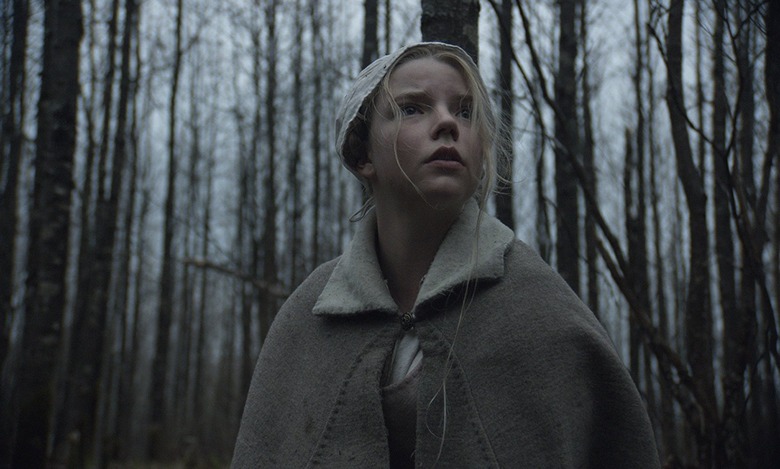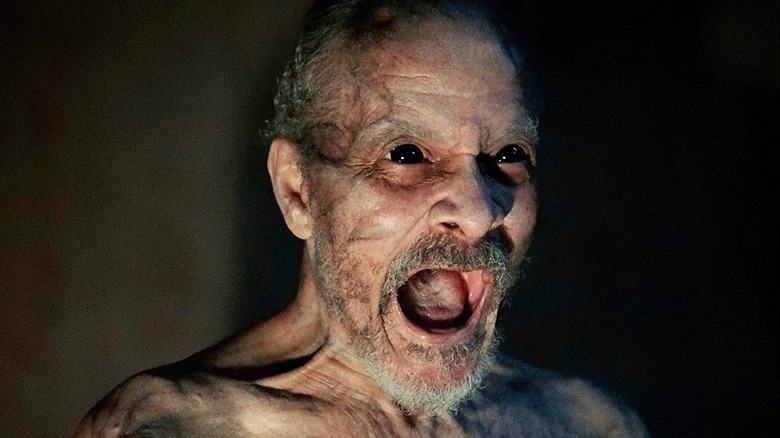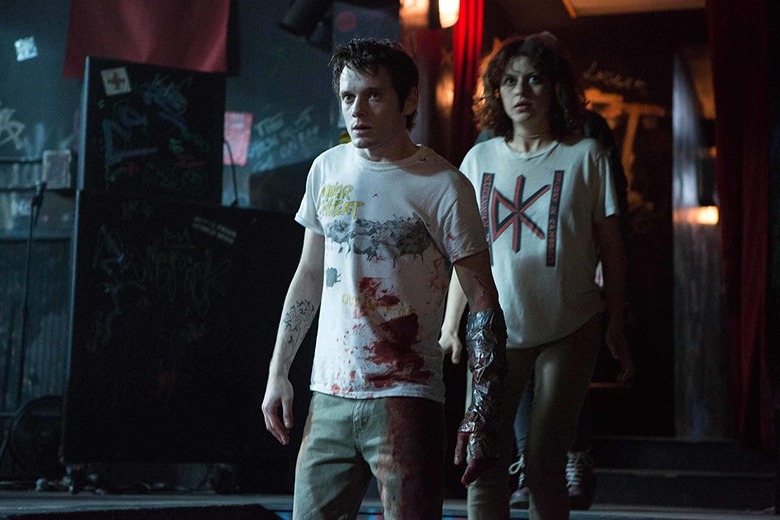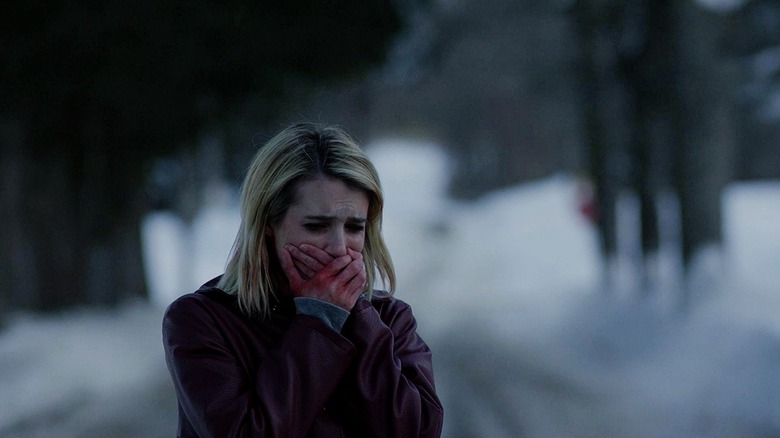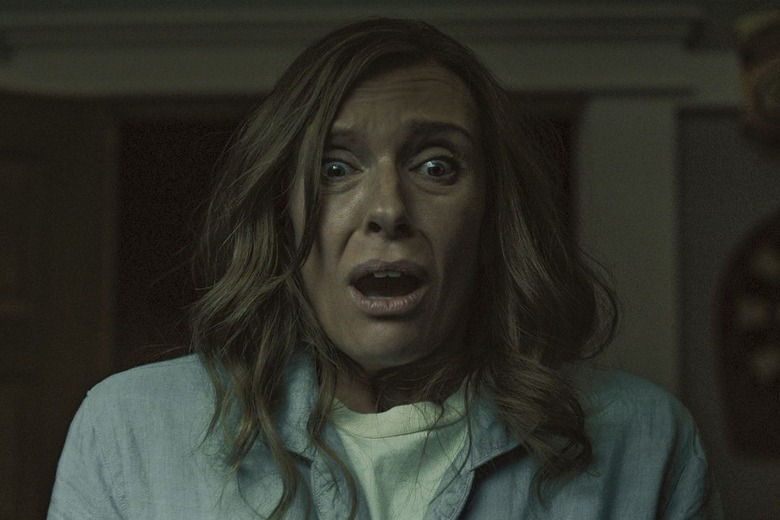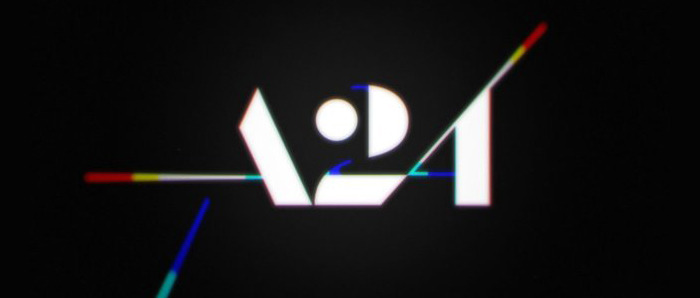What Defines A24's Slate Of Horror Movies?
(Welcome to The Final Girl, a regular feature from someone who has steered clear of horror and is ready to finally embrace the genre that goes bump in the night. Next on the list: A24's unique brand of existential horror.)
For years, I was one of the many people who avoided horror. To me, the genre meant grotesque schlock made to play out cheap scares or misogynistic fantasies...plus I'm a grade-A wimp who gets scared of her own shadow.
But on this months-long journey of "becoming a horror fan," I've discovered that's not the case at all. Horror is an amazingly malleable genre, with the potential to morph into a family drama, a gothic romance, a twisted sexual fantasy, a reflection of social mores, or a manifestation of human suffering. And A24 taught me that it could all happen under one studio.
Because as much as my fall into horror fandom seemed like a long time coming (I was a Buffy the Vampire Slayer and Hannibal fan, for god's sake), it wasn't until A24 started to make its mark as the hub for arthouse horror that I began to really pay attention.
Now, I'm not saying that A24 invented arthouse horror or is doing anything especially new. And I won't even pretend to know the answers to the ongoing "What is horror?" or elevated horror debate. But A24 is tapping into something — and it's a move away from the cheap thrills and jump scares that we often see at the multiplex.
Under the Skin
A24's first major horror release falls smack dab in the middle of the "Is it horror?" debate (although you could argue that Harmony Korine's Spring Breakers is its own kind of horror movie). Released in 2014, in the early years of A24, Under the Skin has been mostly billed as a sci-fi thriller starring a frequently half-naked Scarlett Johansson. But Under the Skin is obviously much more than that.
Viewed in the lens of Scarlett Johansson's career, it's a bold new entry in the actress' mission to transcend the female body and become Hollywood's go-to post-human heroine following movies like Her, Lucy, and later, Ghost in the Shell. But viewed in the lens of a horror movie, it becomes all the more fascinating. Under the Skin doesn't operate like a traditional horror movie at all. Other than a feeling of uncanny discomfort and the inky otherworldly aesthetic that would later be aped by Stranger Things, Under the Skin could almost be described as an indie road trip movie. Jonathan Glazer's film follows Johansson's nameless alien as she drives around Scotland, flirting with and seducing men who she brings back to her house (Spaceship? Void?) to suck the life out of.
I was surprised by how spontaneous the filming style was, and how earthy Under the Skin felt — and it made sense, when I learned that much of the film was improvised with Johansson flirting with unsuspecting Scottish residents in front of covert cameras. But the horror isn't in the way it's filmed, or even the way it's structured (which is as meandering and aimless as many road movies), but in the existential crisis that Johansson's character goes through.
As she lives among the humans, she slowly finds herself becoming more like them — leading her to question how much of her identity is actually human. She's a walking Ship of Theseus: the metaphysical thought experiment that questions whether an object is the same when all of its parts have been replaced. Is the mysterious Woman the alien creature she was at the beginning when she has been so fundamentally changed by the false human appearance that she has donned, and the human characteristics that she has adopted? If not, does that make her human? And finally, is it really so easy to become human? That's where the real horror lies.
The Witch
My journey into horror seriously began with The Witch. I had heard rumblings of how great this film was when it made the rounds at Sundance in 2015, and I was curious about this moody period piece that everyone was calling the next great horror movie. This is where the current debate over "elevated horror" began — after the one-two punch of It Follows and The Babadook the year before — when some critics refused to acknowledge The Witch's horror roots and casual horror fans rejecting Robert Eggers' slow-burning period piece altogether.
Whatever the case, my curiosity was piqued. But, being the scaredy-cat that I am, I ended up waiting until the film was out of theaters and streaming on Amazon Prime until I watched it (in mid-day, with the sun shining as bright as possible). But even after preparing myself with a pile of blankets to hide behind, The Witch took me by surprise. This wasn't the abject experiment in terror or the bloody romp that I anticipated. Instead, I was treated to an unsettling, paranoia-laced drama where the most monstrous thing was the oppressive Puritan society in which the young teenage Thomasin (Anna Taylor-Joy) lives.
But no matter how many blankets I hid behind, I couldn't escape from the movie's overwhelming feeling of dread. It's something that pierces you to your core — and a feeling that future A24 movies would perfect. A slow burn punctuated by several shocking images (I still can't shake the nightmarish scene of Katherine being pecked bloody by a crow), The Witch becomes all the more impactful when it descends into full-blown madness in its third act.
I like to think of The Witch as the modern response to The Exorcist — another movie where a young girl's coming-of-age is transformed into a demonic experience. In both cases, the girls are vilified for daring to become sexual beings. It's feminism writ monstrous. But in The Witch, the demon is not cast out, but celebrated in a wild, hedonistic ritual. It's an amazingly cathartic ending for a feel-bad movie, which is the one thing setting The Witch apart from the rest of A24's horror fare.
It Comes At Night
By the time It Comes At Night was released, I was fully prepared to conquer my own fears and see the movie in theaters. It ended up becoming one of my favorite movies of last year, and a movie that (at the time) I happily declared to be the perfect "anti-horror" movie. Let me explain.
A24's trailers for its horror movies have got to be the most misleading marketing campaigns today. Whether the studio is intentionally trying to bamboozle casual horror fans, or just genuinely don't know how to market the films, I couldn't tell you. But It Comes At Night was a prime victim of this misleading marketing, with trailers building up the Trey Edward Shults movie to be some kind of hybrid zombie/home invasion movie. Instead (it feels like I lead with "instead" a lot for most A24 films), it fell somewhere between a post-apocalyptic supernatural movie and a thrilling psychodrama. There is no traditional structure to It Comes at Night, nor any of the expected jump scares. Instead, it moves at a glacial pace, racking up the tension between the characters in the small, claustrophobic spaces while delivering a profound allegory on grief.
The titular "it" — the monster lurking outside the isolated house where Joel Edgerton and his family had holed up — never appears once. It is the people who are each other's worst nightmares, driven to violence and murder by their own suspicion. That this kind of wanton violence has lurked all along in the hearts of humans not too different from us is where the true horror of this movie resides. It Comes At Night is perhaps the A24 horror film that most strongly preaches the moral of humanity being the real monster. And it does so brilliantly.
Green Room
Punk rock and Nazis! Green Room's premise feels like the logline for a perfect B-movie, and in a way it is. But given the A24 touch, Jeremy Saulnier ultraviolent horror film gains an extra layer of depth.
Following a punk rock band who get trapped in an isolated music venue run by neo-Nazi skinheads, Green Room is the perfect subversion of the home invasion movie. Instead of showing our heroes while trying to ward off invaders on their home turf, it brings the out-of-town punk band into foreign territory that none of them know how to navigate and pits them against white supremacists — led by a terrifying Patrick Stewart, no less.
I'm no expert on the '70s exploitation films from which Green Room takes its inspiration, but I do know a lot about Lifetime home invasion movies! And honestly they're not that different — both are schlocky, pulpy allegories for white flight and the pervading fear that the even the suburbs aren't a safe haven from the horrors of the world. Except one is a lot more gory.
Green Room doesn't shy away from the over-the-top bloodshed of its grindhouse predecessors — in fact, it makes a deliberate move toward as much carnage as possible, with the skinheads eschewing guns for messier machetes. It's a shocking departure from the A24 films I'd seen before (and I'll admit, I had to hide behind my pillows more than a few times because there's just so much blood). But one other thing sets Green Room apart from its A24 counterparts: it has a happy ending. Kind of. True to its name, Green Room is a taut, contained story that offers a light at the end of the tunnel for its surviving characters: a triumph over their obviously evil enemies.
"It's funny, you were so scary at night..." Anton Yelchin's Pat says to Stewart's skinhead leader Darcy, delirious from blood loss and the death of his friends. But the light of the sun only reveals that Darcy and his cohorts for the weary, oh-so-human people whose mistakes inevitably led them to this bloodbath. I guess in a way it is in line with the running themes of A24 horror: it exposes the banality of evil.
The Blackcoat’s Daughter
The Blackcoat's Daughter gets the eerie mood right, but falls apart in the third act. Oz Perkins' supernatural drama follows two prep school students — one a buttoned-up loner, the other a charismatic popular girl — who are left stranded at the school when both their parents fail to pick them up for winter break. While Rose, the popular one, sneaks off with her boyfriend, Kat finds herself experiencing visions and encounters with a strange demonic presence.
Watching The Blackcoat's Daughter, I felt the film was a thematic lead-in to Hereditary, this year's movie that pulls off the metaphors for grief and fate so much. Meanwhile, in The Blackcoat's Daughter, I feel like the metaphor gets lost — despite the deft performances from Kiernan Shipka, Lucy Boynton, and Emma Roberts. I will say that Lucy Boynton remains a criminally underrated actress who steals every movie she's in as the fragile but ultimately vulnerable femme fatale.
Hereditary
Finally, we come to Hereditary. I'll admit that even having become a bonafide "horror fan," I was terrified at the prospect of watching Hereditary. And it delivered, enveloping me in an unsettling, dread-filled experience.
Plenty has already been written about Ari Aster's horrific portrait of a family unraveling after being struck by grief. I don't really need to touch on the movie's depiction of familial demons turned real, nor do I need to gush about Toni Collette's unhinged and instantly iconic performance as a grief-stricken mother who becomes possessed by regret and resentment against her family. (But I can say that I have been haunted by nightmares of Toni Collette attacking me for weeks after I saw this movie.)
It feels fitting that Hereditary is the latest and greatest film to come out of the pantheon of A24 films (though I may put The Witch a smidge above it). It feels like a realization of everything that A24 has been building toward: a sickly, foreboding atmosphere that threatens to swallow you whole, an allegory for grief or humanity's worst impulses, and a strange abiding fixation on Satanism.
Final Thoughts
So, what do A24 films have in common? At first glance, little except perhaps low Cinemascores. But the one thing they do seem to share is an affinity for existential dread and putting forward humanity and its vices as the most evil of monsters. (Or maybe someone at A24 really worships Satan.) And I think it's a combination of these movies' abstract themes and their visually stunning cinematography that A24 has managed to tap into a new wave of horror fans.
Watching all these films for this column, I can't say that A24 is changing horror films in any way. But I think it is changing the way many people see horror. They are by no means doing something revolutionary by merging prestige with panic. It's been done before — often to critical acclaim with films like The Exorcist, The Shining, Rosemary's Baby, and countless others. Horror has always been a genre that deserves to be taken seriously. But this wave of A24 movies is making the argument louder and clearer than ever.

